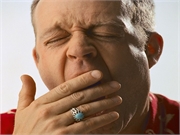- Could Your Grocery Store Meat Be Causing Recurring UTIs?
- Are You Making This Expensive Thermostat Error This Winter?
- Recognizing the Signs of Hypothyroidism
- 10 Strategies to Overcome Insomnia
- Could Artificial Sweeteners Be Aging the Brain Faster?
- Techniques for Soothing Your Nervous System
- Does the Water in Your House Smell Funny? Here’s Why
- Can a Daily Dose of Apple Cider Vinegar Actually Aid Weight Loss?
- 6 Health Beverages That Can Actually Spike Your Blood Sugar
- Treatment Options for Social Anxiety Disorder
Banishing Pandemic Worries for a Good Night’s Sleep

If anxiety and fear about COVID-19 are keeping you awake, rest assured: Adopting a few easy-to-follow habits will help you get a good night’s sleep.
“Now more than ever, we need to get good sleep,” said Dr. Amy Guralnick, a pulmonologist at Loyola Medicine in Chicago. “Sleep can help our immune system function at its best. Getting a good night’s sleep also helps us to think clearly and to problem-solve better.”
And, she added, too little sleep can lead to depression, anxiety and other mental health conditions.
So what can you do to get more — and better — Zzzzzzz’s?
Make a sleep schedule and follow a routine, Guralnick advised. “Having a daily, fixed wake up time is the most important part of the schedule,” she said.
In the hours before bedtime, avoid viewing any technology with a backlight, she suggested. That includes a phone, tablet or a computer. Here’s why: “Your brain thinks that the light coming from those is daylight and it will suppress the release of a hormone called melatonin which helps put you to sleep,” Guralnick explained.
If you suffer from stress or anxiety, consider writing down your worries in a journal. But set it aside before bedtime, she said.
Your bed should be used only for sleep and intimacy. “The bed is not for eating or working or reading or pretty much anything else,” Guralnick said.
If you can’t fall asleep within 20 minutes, get up. Do something boring, she recommended, and go back to bed only when you are sleepy — not just bored.
Avoid napping, because it “eats up your 24-hour sleep requirement,” Guralnick said. If you must, though, do it early in the day and for no more than 20 minutes.
It’s also important to be active, she said. Physical activity will help your body feel tired and help you fall asleep.
Avoid both caffeine and alcohol, which can make it hard to doze off. Remember, they’re in some unlikely places: “Even chocolate and orange soda have caffeine,” Guralnick said. “And alcohol can also ‘fragment’ sleep, so try to avoid drinking alcohol before bedtime.”
More information
The U.S. National Heart, Lung, and Blood Institute offers a guide to healthy sleep.
Source: HealthDay
Copyright © 2026 HealthDay. All rights reserved.










